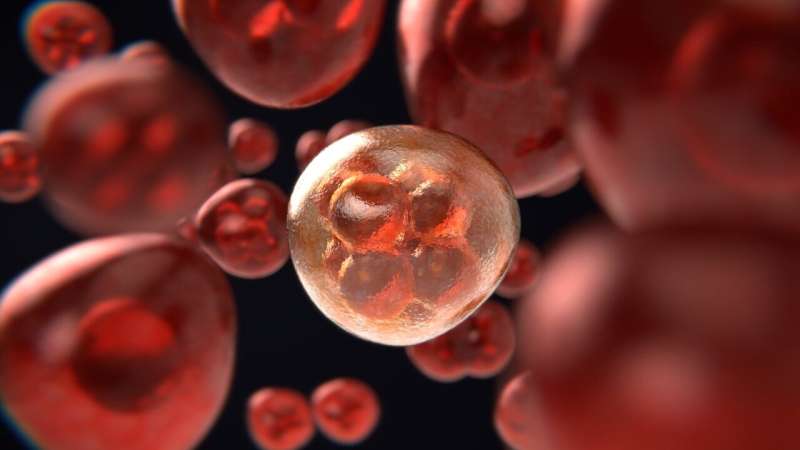This article has been reviewed according to Science X's editorial process and policies. Editors have highlighted the following attributes while ensuring the content's credibility:
fact-checked
peer-reviewed publication
trusted source
proofread
New insights to enhance treatment and diagnosis of blood cancer

A study by researchers from the Cancer Science Institute of Singapore (CSI Singapore) at the National University of Singapore (NUS) has revealed crucial insights into the role of the histone methyltransferase NSD2 and its epigenetic target PKCα in causing t(4;14) translocated multiple myeloma (MM), a high-risk subtype of blood cancer, to be more aggressive and resistant to treatment.
The study was led by Professor Wee Joo Chng, Senior Principal Investigator at CSI Singapore, and Dr. Phyllis Chong Shu Yun, Senior Research Fellow at CSI Singapore. The research team discovered that NSD2 triggers elevated glycolysis through the activation of PKCα, leading to the production of excessive lactate that fuels malignancy and undermines response to immunomodulatory drugs. The findings present potential targets to improve the treatment of myeloma.
Targets for therapeutic intervention
Myeloma is the second most common blood cancer, and t(4;14) myeloma comprises 15 to 20% of MM cases. Compared to other types of myeloma, patients with t(4;14) myeloma have a poorer prognosis with shorter overall survival. Unfortunately, the key deregulated gene in t(4;14) myeloma is not targetable with drugs.
"Our study aims to overcome the limitations of targeting the key deregulated gene in t(4;14) myeloma. It sheds light on the metabolic reprogramming of MM in response to the oxygen- and nutrient-deprived bone marrow microenvironment. By exploring the epigenome and metabolome of NSD2, we sought alternative vulnerabilities that could revolutionize treatment strategies," said Prof Chng, senior author of the study.
The unique connection between NSD2 and cellular metabolism, mediated by histone methylation, offers new horizons in the battle against high-risk MM subtypes. The study's impact is multifaceted, potentially influencing the development of novel medicines and non-invasive diagnostic tests.
For patients with t(4;14) myeloma, targeted metabolic interventions could bring promising therapeutic options, whether through dietary modifications or tailored pharmacological approaches. Furthermore, the discovery that lactate levels could serve as predictive biomarkers for drug response highlights the transformative potential of metabolite signatures in personalized medicine.
Striving towards tailored interventions and personalized care
This study, which is published in Cancer Research, marks a significant stride in unraveling the complexities of MM and holds promise to improving treatment outcomes for patients with high-risk subtypes.
Looking ahead, Prof Chng and his team plan to leverage the knowledge gained from this study to design therapeutic intervention for t(4;14) myeloma. The success of their metabolic characterization of t(4;14) myeloma also paves the way for the team to extend their metabolomic framework to profile other genetically high-risk MM subtypes such as t(14;16) or with 1q21 amplifications, presenting a path towards tailored interventions and personalized care.
More information: Phyllis S.Y. Chong et al, Histone Methyltransferase NSD2 Activates PKCα to Drive Metabolic Reprogramming and Lenalidomide Resistance in Multiple Myeloma, Cancer Research (2023). DOI: 10.1158/0008-5472.CAN-22-3481


















